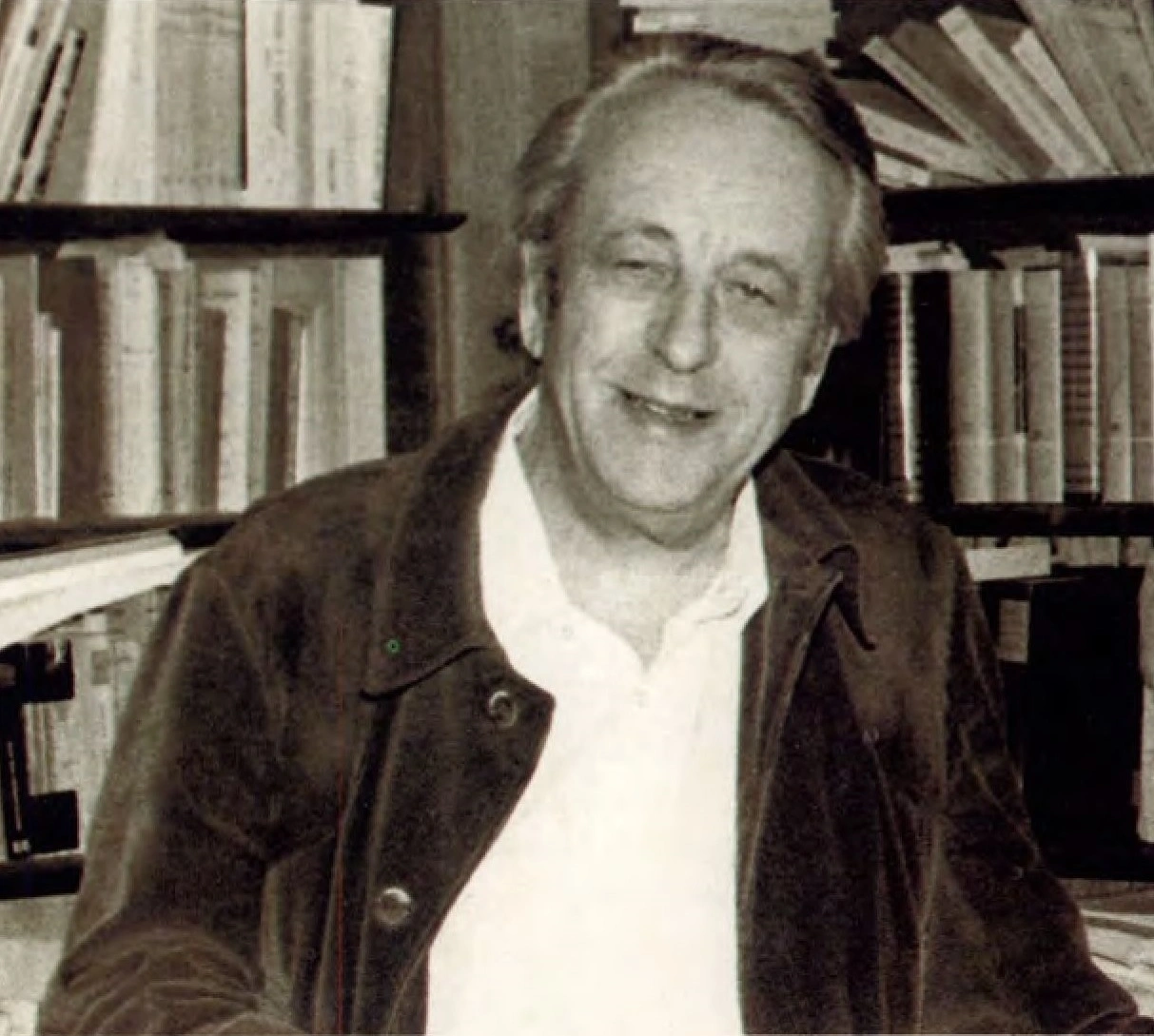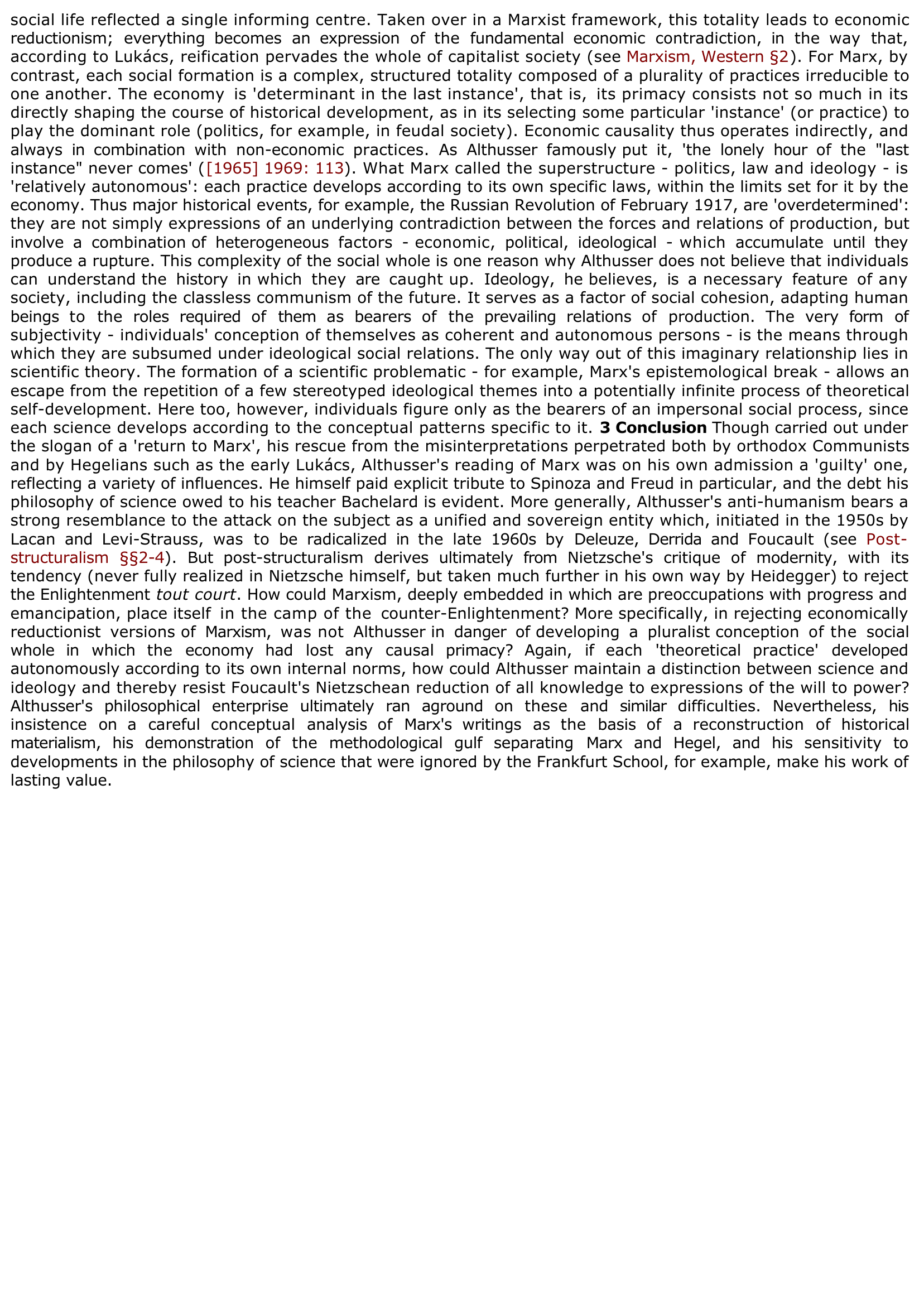Althusser, Louis Pierre
Publié le 15/01/2010

Extrait du document

Louis Althusser was the most influential philosopher to emerge in the revival of Marxist theory occasioned by the radical movements of the 1960s. His influence is, on the face of it, surprising, since Althusser's Marx is not the theorist of revolutionary self-emancipation celebrated by the early Lukács. According to Althusser, Marx, along with Freud, was responsible for a 'decentring' of the human subject. History is 'a process without a subject'. Its movement is beyond the comprehension of individual or collective subjects, and can only be grasped by a scientific 'theoretical practice' which keeps its distance from everyday experience. This austere version of Marxism nevertheless captured the imagination of many young intellectuals by calling for a 'return to Marx', with the implication that his writings had been distorted by the official communist movement. In fact, Althusser later conceded, his was an 'imaginary Marxism', a reconstruction of historical materialism reflecting the same philosophical climate that produced the post-structuralist appropriations of Nietzsche and Heidegger by Deleuze, Derrida and Foucault. Most of the philosophical difficulties in which Althusser found himself can be traced back to the impossibility of fusing Marx's and Nietzsche's thought into a new synthesis. 1 Life On a pessimistic view of his influence, Althusser may be chiefly remembered for strangling his wife, Helene Rytman, on 16 November 1980, in their flat at the École Normale Superieure in Paris. Deemed unfit to stand trial for the murder, Althusser spent the last decade of his life in and out of mental hospitals. His attempt to explain this disaster - in L'Avenir dure longtemps (The Future Lasts A Long Time) (1992), an extraordinary confessional autobiography, posthumously published, which traced the manic depressive outbursts which dogged his adult life back to a Freudian family drama which began even before his birth in Algeria - has been shown by Yann Moulier Boutang (1992) to be as much fiction as fact. Thanks, however, to his own memoirs and Moulier Boutang's biography, the outline of Althusser's public life is now becoming clear.

«
social life reflected a single informing centre.
Taken over in a Marxist framework, this totality leads to economicreductionism; everything becomes an expression of the fundamental economic contradiction, in the way that,according to Lukács, reification pervades the whole of capitalist society (see Marxism, Western §2 ).
For Marx, by contrast, each social formation is a complex, structured totality composed of a plurality of practices irreducible toone another.
The economy is 'determinant in the last instance', that is, its primacy consists not so much in itsdirectly shaping the course of historical development, as in its selecting some particular 'instance' (or practice) toplay the dominant role (politics, for example, in feudal society).
Economic causality thus operates indirectly, andalways in combination with non-economic practices.
As Althusser famously put it, 'the lonely hour of the "lastinstance" never comes' ( [1965] 1969: 113 ).
What Marx called the superstructure - politics, law and ideology - is 'relatively autonomous': each practice develops according to its own specific laws, within the limits set for it by theeconomy.
Thus major historical events, for example, the Russian Revolution of February 1917, are 'overdetermined':they are not simply expressions of an underlying contradiction between the forces and relations of production, butinvolve a combination of heterogeneous factors - economic, political, ideological - which accumulate until theyproduce a rupture.
This complexity of the social whole is one reason why Althusser does not believe that individualscan understand the history in which they are caught up.
Ideology, he believes, is a necessary feature of anysociety, including the classless communism of the future.
It serves as a factor of social cohesion, adapting humanbeings to the roles required of them as bearers of the prevailing relations of production.
The very form ofsubjectivity - individuals' conception of themselves as coherent and autonomous persons - is the means throughwhich they are subsumed under ideological social relations.
The only way out of this imaginary relationship lies inscientific theory.
The formation of a scientific problematic - for example, Marx's epistemological break - allows anescape from the repetition of a few stereotyped ideological themes into a potentially infinite process of theoreticalself-development.
Here too, however, individuals figure only as the bearers of an impersonal social process, sinceeach science develops according to the conceptual patterns specific to it.
3 Conclusion Though carried out under the slogan of a 'return to Marx', his rescue from the misinterpretations perpetrated both by orthodox Communistsand by Hegelians such as the early Lukács, Althusser's reading of Marx was on his own admission a 'guilty' one,reflecting a variety of influences.
He himself paid explicit tribute to Spinoza and Freud in particular, and the debt hisphilosophy of science owed to his teacher Bachelard is evident.
More generally, Althusser's anti-humanism bears astrong resemblance to the attack on the subject as a unified and sovereign entity which, initiated in the 1950s byLacan and Levi-Strauss, was to be radicalized in the late 1960s by Deleuze, Derrida and Foucault (see Post- structuralism §§2-4 ).
But post-structuralism derives ultimately from Nietzsche's critique of modernity, with its tendency (never fully realized in Nietzsche himself, but taken much further in his own way by Heidegger) to rejectthe Enlightenment tout court .
How could Marxism, deeply embedded in which are preoccupations with progress and emancipation, place itself in the camp of the counter-Enlightenment? More specifically, in rejecting economicallyreductionist versions of Marxism, was not Althusser in danger of developing a pluralist conception of the socialwhole in which the economy had lost any causal primacy? Again, if each 'theoretical practice' developedautonomously according to its own internal norms, how could Althusser maintain a distinction between science andideology and thereby resist Foucault's Nietzschean reduction of all knowledge to expressions of the will to power?Althusser's philosophical enterprise ultimately ran aground on these and similar difficulties.
Nevertheless, hisinsistence on a careful conceptual analysis of Marx's writings as the basis of a reconstruction of historicalmaterialism, his demonstration of the methodological gulf separating Marx and Hegel, and his sensitivity todevelopments in the philosophy of science that were ignored by the Frankfurt School, for example, make his work oflasting value..
»
↓↓↓ APERÇU DU DOCUMENT ↓↓↓
Liens utiles
- PHILOSOPHIE ET PHILOSOPHIE SPOHTAHÉE DES SAVANTS, Louis Althusser
- SYSTÈME DE LA NATURE, Maupertuis (Pierre-Louis Moreau de)
- LIRE LE CAPITAL, 1965. Louis Althusser - résumé de l'oeuvre
- POUR MARX, 1965. Louis Althusser - résumé de l'oeuvre
- LÉNINE ET LA PHILOSOPHIE, 1969. Louis Althusser - résumé de l'oeuvre

































